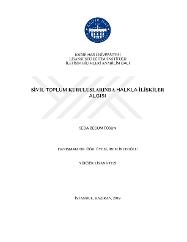| dc.contributor.advisor | İnceoğlu, İrem | en_US |
| dc.contributor.author | Tosun, Seda Begüm | |
| dc.date.accessioned | 2020-02-06T17:27:49Z | |
| dc.date.available | 2020-02-06T17:27:49Z | |
| dc.date.issued | 2019 | |
| dc.identifier.uri | https://hdl.handle.net/20.500.12469/2719 | |
| dc.description.abstract | Günümüzde Sivil Toplum Kuruluşları, demokratikleşmenin başlıca sebebi olmasa da,
demokrasinin temel taşı olarak görülmektedir. STK’ların, devlet ile arasında çift taraflı bir
ilişki bulunması, başka bir deyişle, STK’lar, devletin demokrasisini daha şeffaf bir hale
getirirken devletin de sivil toplum alanındaki örgütler arası güç dengesini koruması
beklenmektedir. STK’lar, devlet ve toplum arasında çok yönlü bir köprü görevi görmektedir.
Yurttaşların STK’lar aracılığıyla, savunuculuk faaliyetlerine ve dolayısıyla, demokratik
yönetim sürecine katılmalarının toplumsal dengeye katkısı yadsınamaz. Özellikle savunu
yapan sivil toplum kuruluşlarının, Doğası gereği toplumu sosyal refah açısından dönüştürme
ve politika etkileme faaliyetlerine katılmaları söz konusudur. Bu noktada, sivil toplum
kuruluşlarının da hak temelli savunuculuk kavramı hakkındaki anlayışları ve toplumdaki
görev ve sorulumlulukları hakkındaki yaklaşımları önem kazanmaktadır. Bu nedenle,
STK’ların, karar mekanizmasının en önemli bileşenlerinden biri olan yöneticilerin, hak
temelli savunuculuk perspektifinden halkla ilişkiler algısının ne olduğu, iletişim politikasını
doğrudan etkileyeceği için son derece önemlidir.
Çalışmada, çocuk hakları alanında savunuculuk yapan yerel STK’ların yöneticilerinin, hak
temellilik ve halkla ilişkiler algıları, derinlemesine görüşme yöntemiyle ölçülmüş ve betimsel
olarak analiz edilmiştir. | en_US |
| dc.description.abstract | Today, non-governmental organizations are seen as the cornerstone of democracy, though not a leading cause of democratization. NGOs are expected to have a bilateral relationship with the state. in other words, they are expected to make the state's democracy more transparent, while the state is expected to maintain a balance of inter-organizational power in the field of civil society. NGOs act as a multidimensional bridge between the state and society. The social balance and transformation power cannot be denied. When advocacy activities are considered as the participation of citizens in the democratic management process through CSOs. Particularly the rights-based non-governmental organizations, by their nature, have the need to transform the society in favor of social welfare and influence policy. At this point, the perceptions of civil society organizations about rights-based advocacy and their duties and responsibilities in society gains importance. Therefore, the public relations perception from the perspective of rigts-based advocacy of the NGO managers, which is one of the most important component of the decision-making mechanism of the NGO, will directly affect the communication policy of the NGO. In this study, the perceptions of rights and public relations of the executives of local NGOs advocating in the field of children's rights were measured and analyzed descriptively through in-depth interviews. | en_US |
| dc.language.iso | tur | en_US |
| dc.publisher | Kadir Has Üniversitesi | en_US |
| dc.rights | info:eu-repo/semantics/openAccess | en_US |
| dc.subject | Sivil Toplum | en_US |
| dc.subject | Halkla İlişkiler Yönetimi | en_US |
| dc.subject | Savunuculuk | en_US |
| dc.subject | Simetrik İletişim | en_US |
| dc.subject | Civil Society | en_US |
| dc.subject | Public Affairs Management | en_US |
| dc.subject | Advocacy | en_US |
| dc.subject | Symmetrical Relationship | en_US |
| dc.title | Sivil toplum kuruluşlarında halkla ilişkiler algısı | en_US |
| dc.title.alternative | Public relations perception in civil society organizations | en_US |
| dc.type | masterThesis | en_US |
| dc.department | Enstitüler, Lisansüstü Eğitim Enstitüsü, İletişim Bilimleri Ana Bilim Dalı | en_US |
| dc.relation.publicationcategory | Tez | en_US |
| dc.identifier.yoktezid | 554719 | en_US |
















